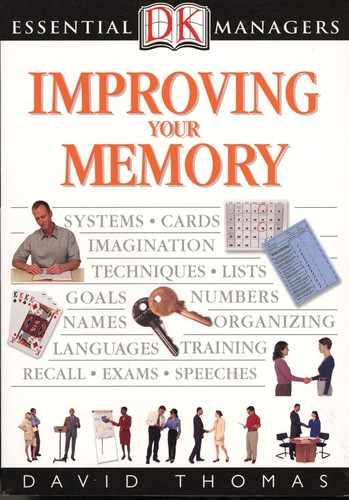
MAINTAINING
SELF-BELIEF
Confidence in your
memory comes from practice
and application of the training
techniques, and also from
knowing that the techniques are
all extremely well founded. They
are used by millions of people worldwide
in their day-to-day lives. There is no mystique
to the process: memory record holders and
world champions use exactly the same
techniques as you will use.
26
Developing Your Memory Potential
✓ Do be adventurous and try adapting
the techniques for yourself. Anything
can be memorized.
✓ Do make notes on how you approach
each memorizing task. At a later date
you can refer back to them and learn
from that experience.
✓ Do share your experiences with
others. It will encourage them
to improve their memory, too.
✗ Avoid trying to do too much at once.
Pick out one specific task to focus
on, and learn from that.
✗ Avoid using the techniques at
inappropriate times. Use them at home
before applying them to your work.
✗ Avoid long, irregular practice sessions.
Practice little and often—15 minutes
a day is more effective than two
long sessions per week.
Things to Do Things to Avoid
Making Techniques
Work for You
T
he key to being able to do something
well is to have confidence in your
ability to do it. Mastering memory
techniques will boost your self-confidence.
Belief in yourself can be the difference
between success and failure.
“
It is not enough
to have a good mind.
The main thing is
to use it well.
”
Descartes
Becoming adept
Mastering the techniques that
are practiced by memory
world champions will give
you the confidence to
apply them whenever
you need to memorize
anything—for
example, when
playing cards.

ADAPTING THE TEMPLATES
The techniques are only the first stage in the
process of improving your memory. The key
to success is learning to apply the various
techniques to your own circumstances and
experiences. Think of them as a mental toolbox:
as you develop your skills, you will pick the most
suitable one for your needs. Your ability to adapt
the techniques will increase as you practice the
generic exercises. It is like learning to drive: one
person may want to drive a cab, another a racecar,
but both have to pass their driving test before
adapting their skills to their specific requirements.
PROGRAMMING
PRACTICE TIME
Learning to improve your
memory through training is
the same as learning any other
skill, physical or mental: you
need plenty of practice if the
techniques are going to work
successfully. A steady but
continuous program of
personal development will
help you improve. Find things
to memorize, such as a list
of names, and practice doing
so, perhaps when out walking,
or sitting on a bus or train.
Making Techniques Work for You
27
Following a program
Plan and stick to a program for practicing memory
techniques. Make use of the time you spend traveling on public
transportation, for example—tune out distractions, and practice
memorizing a list of names, perhaps, or a telephone number.
●
Practice memory skills
in the same way as any
other endeavor—with
application and dedication.
●
Modify the techniques
to suit your own personal
needs.You can use them
however you choose, as
long as they help recall.
FOCUS POINTS
Use
the techniques
Practice
the techniques
Learn
the techniques
Developing your skills
Start by learning the techniques, then
practice them thoroughly. Only then can
you use them to their full potential.
..................Content has been hidden....................
You can't read the all page of ebook, please click here login for view all page.
